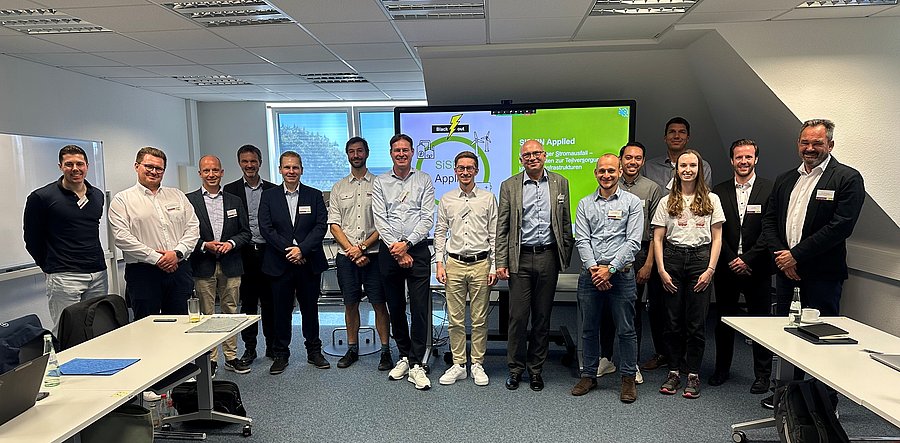Project start
A reality check for the emergency power supply

The partners involved in the SiSKIN Applied project met on site at the University of Wuppertal // Photo Oliver Koch
Building on the results of the predecessor project "SiSKIN", the focus is now on concrete application in real network environments. To this end, existing methods are being further developed and trialled in field tests under realistic conditions.
"Our society is more dependent than ever on a functioning power supply. More and more processes in business, administration and private life require a reliable power supply," explains Professor Markus Zdrallek, who heads the Chair of Electrical Power Supply Technology at the University of Wuppertal. The availability of electrical energy is often taken for granted, as the security of supply in Europe is very high and large-scale power outages are therefore considered unlikely in this country. "However, if such a blackout were to occur, the consequences would be devastating: after just a few days, the nationwide and needs-based supply of essential goods and services to the population would no longer be guaranteed. This would have a dramatic impact on our society and public safety," says Zdrallek.
The study is focussing in particular on the integration of renewable energies and the use of modern battery storage systems. "SiSKIN Applied" pursues an interdisciplinary approach that combines engineering, energy management and social science perspectives. The involvement of associated partners - in particular local authorities, distribution network operators and operators of critical infrastructures - ensures a high degree of practical relevance and transferability of the results.
The project results are to be made available in the form of recommendations for action, planning tools and training concepts in order to sustainably strengthen the resilience of the energy supply in Germany.
The University of Wuppertal is working on the project together with the companies Neue Effizienz and Lülf+ Sicherheitsberatung. The project is also supported by numerous associated project partners throughout Germany.
The project "SiSKIN Applied: Large-scale power outage - possibilities for partial supply of critical infrastructures" is funded by the European Regional Development Fund with around 840,000 euros from the European Union and the Ministry for the Environment, Nature Conservation and Transport of the State of North Rhine-Westphalia.
You can find more information at: www.siskin-applied.de
This might also interest you
Prepared for a blackout: University of Wuppertal presents study on energy supply for critical infrastructure to an international audience
Around 120 participants from Germany, Switzerland and Austria were interested in what emergency concepts for energy supply could look like at a workshop at the end of the predecessor project SiSKIN. At the invitation of the Chair of Electrical Power Supply Technology at the University of Wuppertal, they were given an insight into the results of feasibility studies using the cities of Wuppertal and Leverkusen as examples.
Link to the press release from 4 April 2025
Software for the energy transition: Bergische Uni at the Electrifying Ideas Award
For the energy transition, local electricity, heating, natural gas and hydrogen grids need to be massively expanded and converted, while optimising costs and minimising construction sites. This is precisely what the AtEne software does. The German Electrical and Electronic Manufacturers' Association (ZVEI) nominated the solution, which is being developed at the University of Wuppertal, for the Electrifying Ideas Award.
